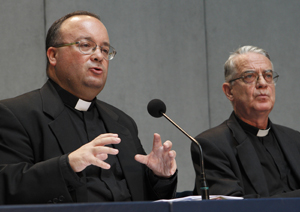
VATICAN CITY –– A leading Vatican official said Pope Benedict XVI’s approval of revised norms on clerical sex abuse sent a clear signal that the church is serious about protecting children and punishing abusive priests.
At the same time, the official said, the Vatican norms alone cannot resolve the problem of sexual abuse, which will require a continued and coordinated effort at every level of the church.
Msgr. Charles Scicluna, the promoter of justice at the Congregation for the Doctrine of the Faith, made the comments July 15 at a briefing for reporters on the revised norms, which simplified and streamlined many of the church’s procedures in dealing with priests accused of sexual abuse of minors.
Msgr. Scicluna said the doctrinal congregation was grateful to the pope for transforming into universal church law a number of practices aimed at dealing more quickly and efficiently with priest abusers.
“I think it gives a signal that we are very, very serious about our commitment to promote safe environments and to offer an adequate response to abuse,” he said.
“This is a very important step from the technical viewpoint of canon law. But a document is always a document – it does not solve all the problems. It’s a very important instrument, but it’s the way you use the instrument that’s going to have the real effect on the life of the church,” he said.
Msgr. Scicluna was asked why the revised norms, like the previous edition, impose “pontifical secret” on the church’s judicial handling of priestly sex abuse.
He said a better term was “confidentiality,” and that it was designed above all to protect the dignity of everyone involved, including the victim, the accused, their families and their communities.
Related articlesVatican fills in blanks on history of sex abuse procedures
Revised sex abuse norms at a glance Vatican says new norms will strengthen efforts against abusive priests |
He also noted that in some cases – for example, a priest’s dismissal from the priesthood – bishops are authorized to divulge the decision and the reasons behind it if this is seen as necessary for the common good of the church.
“So the value of confidentiality is important, but it is not absolute. The good of the church sometimes requires not confidentiality but publicity of a process that has been completed, either with a sentence of condemnation or a finding of innocence,” he said.
Likewise, Msgr. Scicluna said, the church’s insistence on confidentiality has limits in the relationship with civil authorities. Bishops are required to comply with civil law that requires reporting of abuse accusations, he said.
“Confidentiality of canonical proceedings is never an impediment to the duty to denounce (crimes), and is never to the detriment of obedience to civil law,” he said.
Msgr. Scicluna made it clear that Pope Benedict had made the changes in the norms, and in doing so the pope respected his area of competence, he said.
“It is not the task of the pope to give indications about civil law. The indication to obey the law of the state was already stated by St. Paul” and it was unnecessary to reaffirm this principle in a technical text like this, he said.
The revised norms extended the statute of limitations on sex abuse cases, included child pornography in the definition of sex abuse against minors and said sexual abuse of mentally disabled adults will be considered equivalent to abuse of minors.
Msgr. Scicluna was asked if he expected the revisions to prompt a new wave of sex abuse allegations or revelations.
“No, we’re not expecting the floodgates to open. That happened in 2003, with the historical cases from the United States,” he said. “This is an important extension of the law, but it’s not a question about numbers, it’s a question of assuring the respect of the dignity and the safeguarding of these people.”
